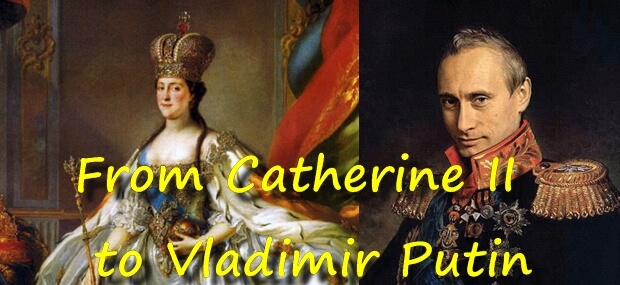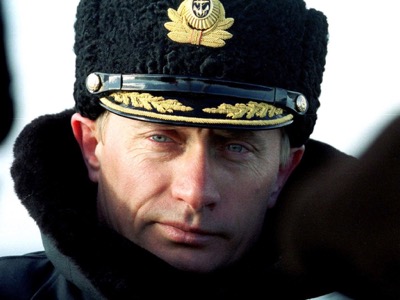From Catherine II to Vladimir Putin
Since the beginning of the war against Syria in 2011, Russia has been supporting this nation against what it considers to be an exterior aggression. While the Western Press explains this behaviour as a case of solidarity between dictatorships, Thierry Meyssan brings to light its real historical motives. He notes that the victory, which also belongs to Moscow, opens a new period for Orthodox culture in Europe.
VOLTAIRE NETWORK | MEXICO CITY (MEXICO) ![]()
In order to build a modern Russia, Tsarina Catherine II decided to make its capital, Saint Petersburg, the world’s leading cultural centre. She rooted her country in its basic cultural foundations of Orthodox Christianity, developed the use of the French language, and invited the greatest European intellectuals and artists to her court, whether they were Catholic, Protestant or Orthodox, even Muslim.
Aware that the retreat of Christianity in the Middle East before the intolerance of the Ottoman Empire threatened a cultural loss for Orthodoxy, and therefore Russia, she entered into war with the Sultan.
This dream was thwarted by the French and British during the Crimean war (1853) and even more so by the Bolsheviks, who rejected the place of Orthodoxy in Russia. In 1918, they played the game of Mustafa Kemal Atatürk on behalf of arms dealer Alexandre Parvus, Lenin’s sponsor.
The dream of Catherine the Great had to wait until 2017 to begin to be realised. President Putin also annexed Crimea and delivered Syria, not from the Ottoman Empire, but from the jihadists, supervised by France, the United Kingdom and the United States. Russia became the protecting power of all populations, whatever their religion, from the banks of the Nile to the Alborz mountains.
The summit at Sochi highlights the role of Russia in the Greater Middle East. It is now the protecting power of Iran, Syria and Turkey – the last two states changed their allegiance from Washington in 1991 to Moscow in 2017.
The awakening of the Orthodox culture will have important consequences in Europe. The continent is historically divided into a Catholic and Protestant zone to the West, and an Orthodox zone to the East. We talk and bargain with God in the West, we submit to his Greatness and we adore Him in the East. Family structures are less egalitarian in the West, and more egalitarian in the East. Since the 11th century, this cultural difference splits Europe. During the Cold War, the « Iron Curtain » did not respect this division, since Orthodox Greece had been attached to NATO, and Catholic Poland had been incorporated into the Warsaw Pact. Today, the extension of the European Union is aimed in priority at imposing the Western European model on the countries of Orthodox culture. Already, we can predict the dissolution of the European Union and the triumph of the cultural model opened in Saint Petersburg.
The Christians of the Orient have never felt themselves to be concerned by these intra-European cultural differences, but the Europeans have always considered them to be either Catholic or Orthodox. From 1848, France had imagined the displacement of the Catholics and the Maronites from Syria to Algeria, and the extermination of the Orthodox populations. Paris thought it could use these Christian Arabs, faithful to Rome, to keep an eye on the Algerian Muslims. Failing that, it ended up by using the local Jews (the Crémieux Decree) and entrusting them with the mission (1870). More recently, during the wars against Iraq and Syria, Western Europeans welcomed many Oriental Christians, who were in reality exclusively Catholics, never Orthodox.
For Syria, the work of President Putin is the occasion to return to its own foundations after the experience with the jihadists, who seek to impose their unique cultural model on everyone – Syria is only great when it takes care of all its populations without exception. In the beginning, Vladimir Putin thought he could organise a « Congress of the Syrian Peoples » in Sochi. He finally recognised that in Syria, contrary to Russia, no community owns its own territory, they all live mingled together in their unique, shared homeland. It will therefore be a « Congress for a Syrian dialogue ».
Translation
Pete Kimberley
Source
Al-Watan (Syria)


